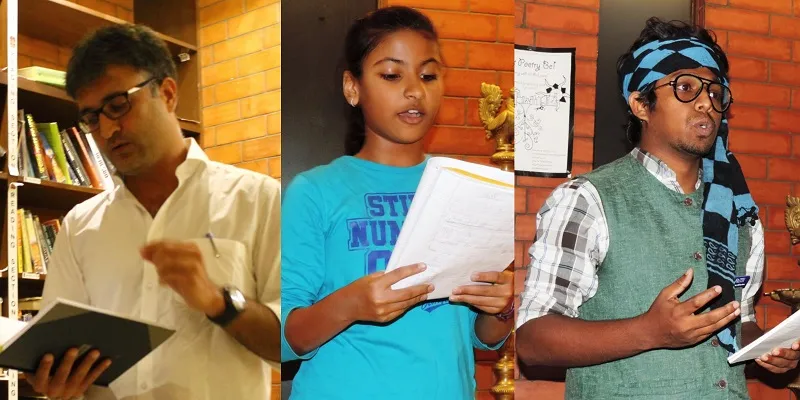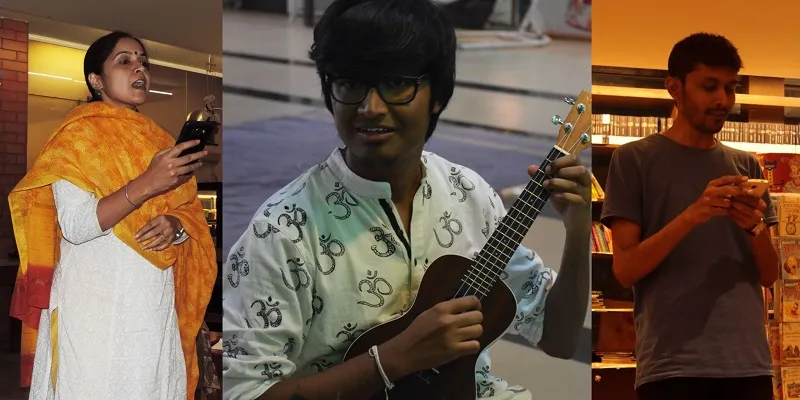The new generation of Bengaluru poets
“See, men and women in Bangalore live like animals in a forest do.”
- Arvind Adiga
Last September, I had the opportunity of co-hosting the Bengaluru chapter of 100 Thousand Poets for Change. It is an event that is organised worldwide every year, where poets, musicians, and other creative people come together and share with the audience their work that promotes peace and sustainability, and inspires serious social, environmental and political change.
I was pleasantly surprised by the spectrum of issues and perspectives the poets raised through their work. The youngest participant at the event was Shirin Laturkar, a 14 year-old girl, who read a poem on LGBT rights. In her poem, titled, A Rainbow of Colours, Shirin reflected upon her day-to-day observations of the repressed gender, and the widespread apathy in the society at large. Her poem wittily depicted the irony of ignorance in the concluding lines –
In traffic jams there are street hawkers
They sell umbrellas with a rainbow of colours
But if their significance was known,
Would there still be buyers?
Shirin, like many others, represents the new generation of poets in Bengaluru. This ‘new generation’, as the phrase would typically mean, is not a generation of youngsters alone, but a more diverse conglomeration of all age groups representing a diverse set of ideas. A majority of these new generation poets have started writing recently, while others have either rediscovered poetry or have found the confidence to share it with a larger audience in recent times. One such poet is Amruta Dongray, a household name among Bengaluru poets, who discovered poetry in 2010, after shifting to Bengaluru from Mumbai (where she had lived for 40 years). Amruta says,
“Over the years, I have noticed that poets no longer shy away from sharing their works. They are confident and willing to read and participate at the many poetry events that are held across the city. Their work has been inspirational for others to write as well. The fact that this city provides several non-judgemental platforms to amateur poets to showcase their works has encouraged so many poetry writers to come together to form a strong poet community.”

An eventful city
Little known to many outside Bengaluru, the city has always had a very rich tradition of poets. Most old Bangaloreans will remember the poetry sessions in Koshy’s restaurant where small groups of well-read people gathered on many mornings to discuss or recite poetry. The Airlines Hotel, Cubbon Park and many private homes stand testament to similar poetic gatherings. Poetry has always been an escape from the city life for many, in search of solitude or nostalgia. As Amarendra Pandey, a PhD in molecular physics, writes in his poem Terracotta Soldiers –
Here is nothing that burns yellow
giving the light that raised civilisations and enabled following civilisations to see it happening.
Yellow, the colour of hearth, is the thing in which people see their deepest dreams.
But here it is dark – an unknown place in the depths of quiet continent of memory..

In the recent years, the number of people writing poetry has increased drastically in the city. This sudden cultural evolution can be attributed to many changes the city has witnessed. The most prominent development is the significant rise in the number of spaces and events that encourage the literary form. Creative spaces such as Atta Galatta, Urban Solace, Lahe Lahe, and The Humming Tree have helped develop a thriving community of poets. Regular poetry events such as Anjuman, Poetry in the Park, Open Sky Slams, and Airplane Poetry Movement have further helped this evolving culture. According to Amruta,
“Every month, there are at least six to eight events across the city purely for poetry. These events are free and open for all. They are informal and not intimidating. Owners of spaces extend their full support to amateur poets without hesitation. In all, Bangalore provides a healthy, conducive and encouraging space for anyone who writes poetry.”
Amruta has been organising Let Poetry Be for more than two years now. The monthly event organised at Atta Galatta is greatly driven by a community of experimental poets who come up with newer themes and topics every month and spend the next month working on these ideas, and, if successful, present their work.

This growing aptitude for experimentation and willingness to work hard has further propelled this evolving culture of poetry in the city. Every poet is on a learning spree. According to Maitreyee Chowdhury, Editor, Fiction and Poetry, The Bangalore Review,
“Poets here are not keen to be 'seen' as poets, neither do they care about what works for poetry or not. They make their own rules as far as the subject, narration or style is concerned. I think that's the most unique thing about Bangalore poetry.”
The Dharwad of poetry
Bengaluru’s diversity has played a major role in the city’s evolving culture of poetry. Bangaloreans from different walks of life, sometimes not related to creative fields, have started to reflect upon their original experiences in the form of poetry, leading to some exceptional creativity. Language is not a barrier either, thanks to Bengaluru’s open-minded and liberal culture. Add to this the growing collaboration between poetry and other evolving art forms in the city, such as theatre, painting, storytelling, and film-making; and you have a recipe for magic.
Bengaluru in many ways has the potential of becoming the Dharwad of poetry. The north-Karnataka town, owing to its geographical placement and cultural influences, turned into the melting pot of Hindustani and Carnatic music. Thanks to the cross-cultural collaborations that took place in Dharwad over decades of experimentation, which often went beyond the barriers of languages and religion, the town today takes pride in its long list of musical maestros. These include Kumar Gandharva, Bhimsen Joshi, Gangubai Hanagal, Basavaraj Rajguru, Puttaraj Gawai, Mallikarjuna Mansur, Venkatesh Kumar, among others.

Poetry, like music, is an art of patience and perseverance. Among the poets I hang out with, I have witnessed a significant rise in the sense of responsibility, humility and an aptitude for learning. Cross-cultural exposure, Internet, and a natural habit of reading play a great role. As Maitreyee has pointed out, instead of being ‘seen’ as poets, this generation is more interested in making the ‘poem’ work. In her poem Inheritance, Darsana Mohan, a young poet from the city writes –
The last time I was home
We spent an evening reading Sugathakumari
On a front porch that knew few steps
My tongue slipped clumsily over Malayalam rolled into song
And she held my hand to pick up the words I had misplaced…
This year, the city organised its first literature festival dedicated to poetry alone. Over 50 local, national and international poets performed at Bengaluru Poetry Festival. Over the two-day-long festival, these poets read in Kannada, English, Hindi, Urdu, Malayalam, Tamil, Telugu, Bengali, Odia, and Maithili. Ten workshops were organised by senior poets from across the globe, who took sessions on different aspects of poetry, from content to form, imagery to rhetoric, and phonetics to aesthetics. Over 3,500 people attended the festival.
One of the prominent poets at the festival was C. P. Surendran, a senior poet and novelist from Mumbai and the former editor-in-chief of DNA newspaper. On his Bengaluru experience, he wrote the following in Khaleej Times –
“I came across, a young Story Teller, Vikram Sridhar, who said that is what he does for a profession: Tell stories. I can't think of any other city in India, where a man declares his job as story-telling. And he said he charged for his sessions.”







